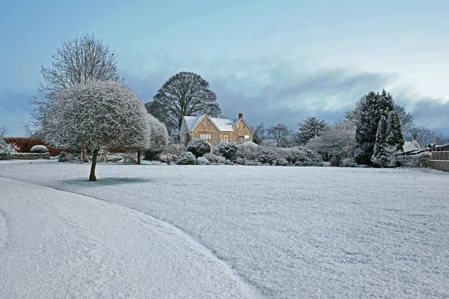Keep your house protected from the winter elements with our top tips.
While you can protect yourself from the cold weather by wrapping up warm in your knitted scarves and bobble hats, you may also want to think about protecting your home this winter too, in order to avoid any nasty surprises.
Maintain a warm house
Despite rising energy bills, it’s better to set your thermostat to a minimum temperature of around 12°C at regular intervals, rather than have periods where the heating isn’t on at all. This will keep the water flowing and prevent any potential issues with external pipes, as some of the most expensive winter damage can come from frozen pipes bursting.
Keep pipes warm
Even if your house is cosy and warm, your water pipes are still able to freeze. To ensure your pipes keep warm this winter, wrap them up with insulation material and open your kitchen and bathroom cabinets to allow warm air to circulate around the pipes.
Shut off water to your outside plumbing fixtures
To prevent your outdoor plumbing fixtures from freezing, disconnect and drain any taps, water features, and sprinkler systems connected to external water outlets.
Protect the outside of your house
Full gutters can increase your chance of ice forming on the roof, which can cause ice damage. Clean your gutters of loose leaves and debris as soon as possible so that water doesn’t build up and freeze.
Know where your stop tap is
Stop taps are usually found under the kitchen sink or around the downstairs toilet. Make sure you understand how to turn this on and off incase of potential flooding from a burst pipe, as turning it off will stop the water flow immediately.
Going on holiday?
If you’re going away, you may want to think about shutting off the water to your house and draining your plumbing. This way, you won’t have to worry about returning to any plumbing failures or freezing pipes.
Once you’ve ticked off all of the above, your house should be in good stead for the upcoming winter, leaving you to relax and enjoy the frosty weather.
Important information
Your home may be repossessed if you do not keep up repayments on your mortgage.
There may be a fee for mortgage advice. The actual amount you pay will depend on your circumstances. The fee is up to 1% but a typical fee is 0.3% of the amount borrowed.
You may have to pay an early repayment charge to your existing lender if you remortgage.

